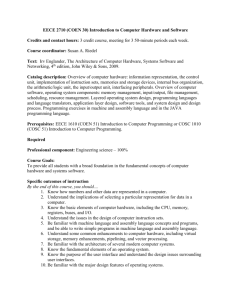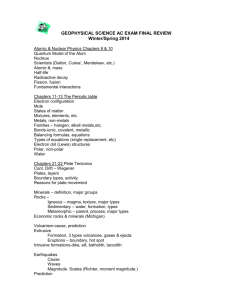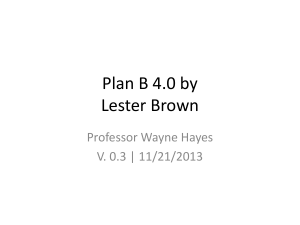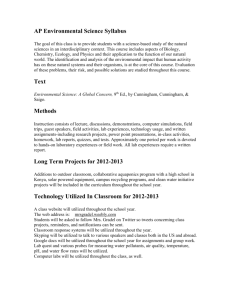AP Environmental Science (APES)
advertisement
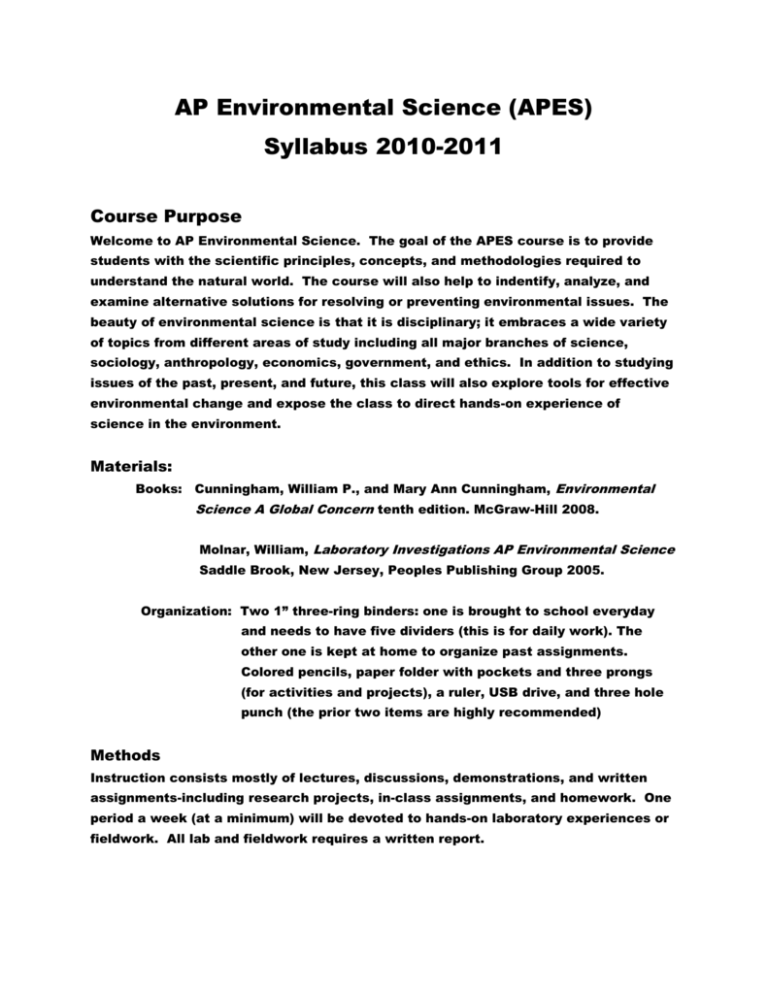
AP Environmental Science (APES) Syllabus 2010-2011 Course Purpose Welcome to AP Environmental Science. The goal of the APES course is to provide students with the scientific principles, concepts, and methodologies required to understand the natural world. The course will also help to indentify, analyze, and examine alternative solutions for resolving or preventing environmental issues. The beauty of environmental science is that it is disciplinary; it embraces a wide variety of topics from different areas of study including all major branches of science, sociology, anthropology, economics, government, and ethics. In addition to studying issues of the past, present, and future, this class will also explore tools for effective environmental change and expose the class to direct hands-on experience of science in the environment. Materials: Books: Cunningham, William P., and Mary Ann Cunningham, Environmental Science A Global Concern tenth edition. McGraw-Hill 2008. Molnar, William, Laboratory Investigations AP Environmental Science Saddle Brook, New Jersey, Peoples Publishing Group 2005. Organization: Two 1” three-ring binders: one is brought to school everyday and needs to have five dividers (this is for daily work). The other one is kept at home to organize past assignments. Colored pencils, paper folder with pockets and three prongs (for activities and projects), a ruler, USB drive, and three hole punch (the prior two items are highly recommended) Methods Instruction consists mostly of lectures, discussions, demonstrations, and written assignments-including research projects, in-class assignments, and homework. One period a week (at a minimum) will be devoted to hands-on laboratory experiences or fieldwork. All lab and fieldwork requires a written report. Unit # Activities/Chapters Unit 1: Environmentalism Time (Weeks) 1.5 Chapter 1 History of Conservation Chapter 2 Environmental Ethics Topics: 1. Tragedy of the Commons 2. Environmental History 3. An Ecological Footprint Lab: Ecosystem Columns Video: The Lorax, Hot Politics (Frontline) Unit 2: Geology: Processes, Hazards, Soils, and Mapping Chapter 14 3.5 Geology and Earth Resources Topics: 1. Plate Tectonics and Geologic Processes 2. Soil Formation and soil profiles 3. Characteristics of soil and reading a soil triangle Lab: Soils-How and why are they different Lab: Topographic Maps Lab: Soil Salinization Unit 3: The Atmosphere Chapter 15 Air, Weather, and Climate Topics: 1. Frontal systems and Coriolis effect 2. Ocean Currents and el nino 3. Greenhouse gasses and Global warming Lab: Air Quality Monitoring Lab: Outdoor Albedo Lab: Biogeochemical Cycle Project Test: Chapters 1,2,14, and 15 Unit 4: The Living World Chapter 3 5.0 Matter, Energy, and Life Topics: 1. Review of General Chemistry 2. Trophic levels and Productivity 3. Nutrient Cycles and energy flow Lab: Eating at a Lower Trophic Level Lab: Energy from Yeast Cells Lab: Net Primary Productivity Lab: Food Webbing Chapters 4,5,11,12,13 Biodiversity Topics: 1. Communities and interaction 2. Evolution and Natural Selection 3. Biomes, Restoration, and Management Lab: Brine Shrimp Abiotic Factors Lab: Predator/Prey Simulation Lab: Gather your Food Lab: Transect Study at Kenyon Forest Preserve using FQI Test Chapters 3-5, and 11-13 Unit 5 Population Dynamics 3.5 Chapters 6 and 7 Topics: 1. Population Growth 2. Factors that Influence Growth 3. Demographics Lab: The Power of Doubling Lab: Something’s Fishy Lab: Population Distribution and Survivorship (Field Trip) Test Chapters 6 and 7 Unit 6 Land and Water Use 3.5 Chapter 9 Food and Agriculture Topics: 1. Nutrition 2. Soil Conservation 3. Genetically Modified Crops 4. Sustainability 5. Pest Control Lab: Soil Nutrients and pH First Semester Final Unit 6 (cont) Land Use Chapters 14 and 22 Mining and Urban land Development 1.5 Topics: 1. Mining and Mining Laws 2. Urbanization 3. Smart Growth Lab: Cookie Mining Guest Speaker: Randy Recklaus-City of Batavia Test Chapter 9, 14, and 22 Unit 7 Energy Resources 3.0 Chapters 19 and 20 Conventional and Sustainable Energy Topics: 1. Renewable and Non-Renewable 2. Waste Generation and Disposal 3. Pollution: Air, Water, and Land Lab: Home Energy Audit Lab: Energy and Recycling Chapter 21 Solid, Toxic and Hazardous Waste Topics: 1. Waste Disposal Methods 2. Landfill Construction 3. Hazardous and Toxic Wastes 4. Recycling Lab: Solid Waste Diary Lab: Disposal of Nuclear Waste Field Trip: Fox River Water Reclamation District Tour Test Chapters 19-21 Unit 8 Water Use, Management, and Pollution Chapter 17 Water Use and Management Topics: 1. Resources and Compartments 2. Availability and Shortages 3. Conservation Lab: Water Loss Drop by Drop Lab: Salinization Lab Chapter 18 Water Pollution Topics: 1. Type and Effects of Water Pollution 3.0 2. Pollution Control and Legislation Lab: Water Quality Assessment Test Chapters 17-18 Unit 9 Environmental Health, Toxicology, and Legislation 3.0 Chapters 8 and 24 Topics: 1. Health Hazards 2. Movement and Distribution of Toxins 3. Risk Assessment 4. Environmental Policy 5. Environmental Laws, Treaties, and Conventions Lab: LC50 of Brine Shrimp (Toxic Tea) Lab: Bioassay Experiment with Lettuce Project: Environmental Law Timeline Project: Political Activism Letter Test Chapters 8 and 24 Ecological Economics 1.5 Chapter 23 Topics: 1. Economic Worldviews 2. Natural Resource Accounting 3. Trade, Development, and Jobs Project: Personally Responsible Consumerism What Shall We Do? Chapter 25 Topics: 1. Education 2. Accountability Lab: Campus Environmental Audit 1.0





